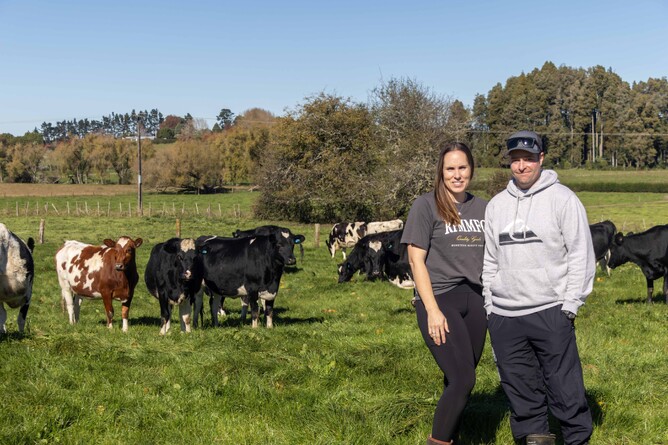Award winning cheese starts with premium milk. Waikato share milker Josh Taylor, who milks 400 cows on 150ha owned by the Meyer Cheese company, says genetics are key to the success of both businesses.
Josh, wife Ashley and children Jacob (11), Liam (10) and Cade (7) are in their first season 50/50 share milking on the Meyer family farm, which is also home to the award-winning Meyer Cheese factory.
Meyer cheese is consistently awarded among New Zealand’s top cheeses. In this year’s New Zealand’s Champions of Cheese Awards, they won gold for their aged flavour cheese, Iff Farmhouse Cheese, and their Dutch-style cheese. They also won three silvers and three bronze medals.
The Taylor’s CRV herd produces an average of 140,000kg/MS with the aim to achieve 150,000Kg/MS in the coming season. Forty percent of milk produced goes to the on-farm Meyer cheese factory and the balance is supplied to Fonterra.
“It’s what interested us most about the farm. You can look through the cheese factory window and see your milk being stirred within two hours of milking. There are not many farms where you can experience the entire value chain. And it really is amazing tasting cheese,” says Josh.
Their partnership with the Meyer family is a perfect match. The Meyer family are generational, award-winning cheese makers, but not so much dairy farmers themselves. Josh is a passionate dairy farmer with an interest in breeding the best cows possible to produce the best milk which delivers a win-win situation. That’s where CRV comes in, says Josh.
Josh specifically sought a CRV herd when he was looking to buy cows because he likes CRV’s genetics that he says deliver desirable traits in temperament, type, and overall efficiency and productivity.
“Stock agents will always tell you, look after BW, which I always have in the back of my mind. But I believe that if I'm milking these cows, I want to breed a type of cow I like. I'm not just going to milk a cow based on its BW. If I like milking them then other people will too and that has served me well,” says Josh.
His herd is part of CRV’s Progeny Testing Programme which has exposed him to genomic sires, allowing him to accelerate the genetic gain of his herd.
“We’ve been progeny testing for four years now and we’ve got our third group of heifers coming in this year. They're all bred using genomically tested bulls. We’ve always done artificial breeding and I have always been very interested in the breeding side of our business. It’s how we can create the most efficient herd on a low input system,” says Josh.
Previously they had been inseminating their yearlings with proven bulls to try get better genetic gain earlier. However, when the opportunity arose to join the Progeny Test Breeding Programme, they felt it was a great way of getting the genetic gain early by numbers of heifer calves on the ground.
Josh’s breeding goal is to breed a 500kg cow that is efficient in maintaining milk production with a sound type, quite temperament and longevity.
They strive to have a low input (System 2) farm, with quality breeding and great farm management being key to that, says Josh.
“We do regular farm walks, to make sure our silage and feed is good quality. We make sure we are breeding the best herd possible, because it makes a difference to our bottom line and does make a difference to the cheese,” says Josh.
“The real bonus with being in the progeny testing is we get to see the future genetics early and with genomic sires we get that genetic gain much faster. From being inseminated to the heifers entering the herd is roughly three years and that speed of genetic gain and herd building is paramount for us as sharemilkers,” says Josh.
The herd is fully DNA tested so they can accurately track their cows’ genetics and choose specific sires. This season Josh will use 40 sexed semen straws from genomic sires over his top cows to further optimise his breeding.
“Our record keeping must be accurate and up to date to effectively manage our breeding programme. We aim to do the best job possible, because it’s not just our herd we are proving, it helps to prove the next generation of quality sires for ourselves and other farmers alike,” says Josh.
“Using the genomic sires sexed semen we can drive the genetic potential of the herd even faster, ensuring high value, quality heifers, crucial for future breeding,” says Josh.
He believes by breeding with CRV they are well on the way to achieving their future breeding goals.
“I am quite passionate about breeding. You don't want to be milking cows that aren't efficient because of the current cost of farming and the way the industry is heading, so you want to be breeding from the best. For us breeding with CRV’s genomic sires and using sexed semen is money well spent for future gains.”
